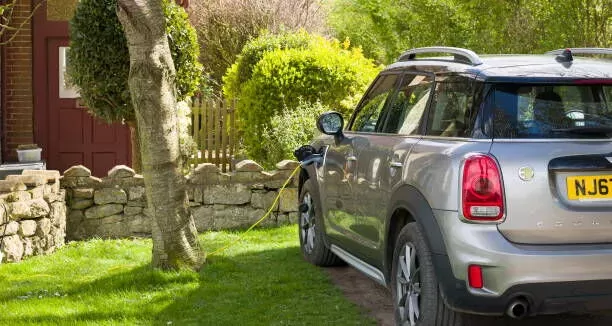Notifications
8 minutes, 11 seconds
-22 Views 0 Comments 0 Likes 0 Reviews

Introduction
As a top EV charger manufacturer in China, LiCB Charge offers reliable AC and DC electric vehicle charging stations along with comprehensive charging solutions.
As electric vehicles (EVs) continue to rise in popularity, having an efficient home charging solution is becoming more essential. While public charging stations are useful for longer trips, most EV owners charge their vehicles at home. A Level 2 EV charger provides the perfect balance of speed, convenience, and cost-effectiveness, making it the ideal choice for daily charging needs.
In this guide, we’ll cover:
What a Level 2 home EV charger is and how it compares to other charging options
The key benefits of installing a Level 2 charger at home
Different types of Level 2 chargers (plug-in vs. hardwired)
How renewable energy and smart charging can enhance your EV experience
The simple process of professional installation
By the end, you’ll understand why installing a Level 2 home charger is a smart investment for any EV owner.
A Level 2 EV charger uses a 240-volt electrical circuit, similar to what powers large appliances like electric dryers or ovens. Unlike a Level 1 charger, which plugs into a standard 120V outlet and provides only 3-5 miles of range per hour, a Level 2 charger delivers 32 to 80 amps of power, significantly reducing charging times.
Level 2 home EV chargers provide a significant upgrade in charging speed compared to standard Level 1 units. With the ability to add between 20 to 40 miles of driving range per hour, these chargers drastically reduce the time needed to recharge your electric vehicle. Most models provide power outputs ranging from 7.7 kW up to 19.2 kW, allowing for a full charge in approximately 4 to 10 hours—perfect for overnight charging.
These chargers are compatible with all modern electric vehicles, and Tesla owners can easily connect using a simple adapter. Whether you're commuting to work or heading out on a weekend trip, a Level 2 charger ensures your EV is always ready to go.
With about 80% of EV charging done at home, installing a Level 2 system offers unmatched convenience. It eliminates the stress of finding public charging stations and reduces range anxiety. Charging at home provides independence, saves time, and guarantees your vehicle is fully charged every morning.
Faster Charging
A Level 2 charger is up to 7x faster than a Level 1 charger. Instead of waiting 20+ hours for a full charge, most EVs can recharge overnight. This is ideal for drivers with long commutes or frequent trips.
Ultimate Convenience
No more searching for public chargers or waiting in line. With a home charger:
Plug in at night and wake up to a full battery.
Avoid peak-hour pricing at public stations.
Charge while you sleep or work from home.
Lower Charging Costs
While there is an upfront cost for installation, home charging is cheaper than using public stations:
Saves around 1/3 compared to public charging fees.
Lower electricity rates during off-peak hours.
No subscription fees (unlike some charging networks).
Increased Home Value
Homes with pre-installed EV chargers are more attractive to buyers, potentially boosting resale value.
Smart Charging Features
Many Level 2 chargers come equipped with:
Wi-Fi/Bluetooth connectivity for remote monitoring.
Scheduling options to charge during low-rate hours.
Energy tracking to optimize charging efficiency.
When choosing a Level 2 charger, you typically have two installation options:
Plug-In Chargers
Requires a 240V outlet (NEMA 14-50 or NEMA 14-30, similar to those for dryers/ranges).
Easier to replace or upgrade since it’s not permanently wired.
Best for chargers under 40 amps (most home models).
Hardwired Chargers
Directly connected to the electrical panel for a more secure setup.
Required for high-power chargers (48A and above).
More durable, ideal for outdoor installations.
Note: If your home doesn’t have a 240V outlet, an electrician can install one during setup.
Solar-Powered EV Charging
Pairing a Level 2 charger with solar panels can make charging nearly free and 100% renewable. Benefits include:
Lower electricity bills by using solar energy.
Reduced carbon footprint with clean power.
Potential tax credits for solar + EV setups.
Bidirectional Charging (V2H & V2G)
Bidirectional charging is a cutting-edge feature in newer EVs that allows your car’s battery to:
Power your home (Vehicle-to-Home, V2H) during outages.
Supply energy back to the grid (Vehicle-to-Grid, V2G) for credits.
Act as a backup battery in emergencies.
Example: The Ford F-150 Lightning and Nissan Leaf support V2H, turning your EV into a mobile power source.
Choose the Right Charger
Check your EV’s max charging rate (e.g., 32A, 48A).
Decide between plug-in or hardwired.
Look for ENERGY STAR-certified models for efficiency.
Hire a Licensed Electrician
A professional ensures:
Safe, code-compliant installation.
Proper electrical panel upgrades (if needed).
Permits & Inspection
Most areas require a permit for EV charger installations, followed by an inspection.
Enjoy Fast, Reliable Charging!
Once installed, simply plug in your EV and enjoy the convenience of home charging.
While DIY installation may seem tempting, professional installation ensures:
Safety: Correct wiring, circuit protection.
Compliance: Adherence to local electrical codes.
Warranty Protection: Many chargers require professional installation for warranty validation.
Optimal Performance: Ensures the correct voltage and grounding for efficiency.
A Level 2 home EV charger is the best solution for faster, more convenient, and cost-effective charging. With speeds up to 7x faster than a standard outlet, compatibility with solar power, and emerging bidirectional charging technologies, it’s a smart investment for any EV owner.
By choosing professional installation, you ensure a safe, efficient, and future-proof charging setup that enhances your EV experience for years to come.
Get started today and enjoy the benefits of hassle-free home charging!Know more about Google SEO Directory
China EV Chargers EV Charger Manufacturer Smart EV Chargers Electric Car Chargers Electric Vehicle Chargers Electric Car Charging Stations

